Towards the end of last month, we were delighted to welcome Bulgarian-Nigerian ethnobotanist Jonn Gale for an immersive 12-week residency, structured as part of her PhD placement. Based in London, her interdisciplinary practice spans photography, moving image, sound, research, and ecology. Her work combines archival analysis, ethnobotanical research, and sensory-focused visual ethnography, to explore multi-species relationships and the historical role of plants. As part of her practice-led PhD at Birkbeck, University of London, in collaboration with the Linnean Society of London, she is currently investigating the overlooked contributions of Black and Indigenous naturalists to 18th- and 19th-century botanical knowledge, working to develop decolonial approaches to archival research.
During her residency, Jonn hopes to engage with both urban and rural environments, splitting her time between G.A.S. Lagos and the G.A.S. Farm House in Ijebu. In Lagos, she looks forward to conducting research in the G.A.S. Library and Picton Archive while also collaborating with local practitioners, naturalists, and scholars. At the Farm House, where she will spend the majority of her residency, she will further immerse herself in local ecological knowledge, working closely with plant growers, healers, and other knowledge-keepers to document traditional agricultural practices and biocultural conservation efforts. Jonn’s residency will focus on reimagining botanical archiving, facilitating community-centered workshops, and contributing to knowledge-sharing initiatives. She aims to develop an accessible botanical archive that integrates both physical and digital elements, helping to address challenges related to the conservation and transmission of traditional plant knowledge in Nigeria.
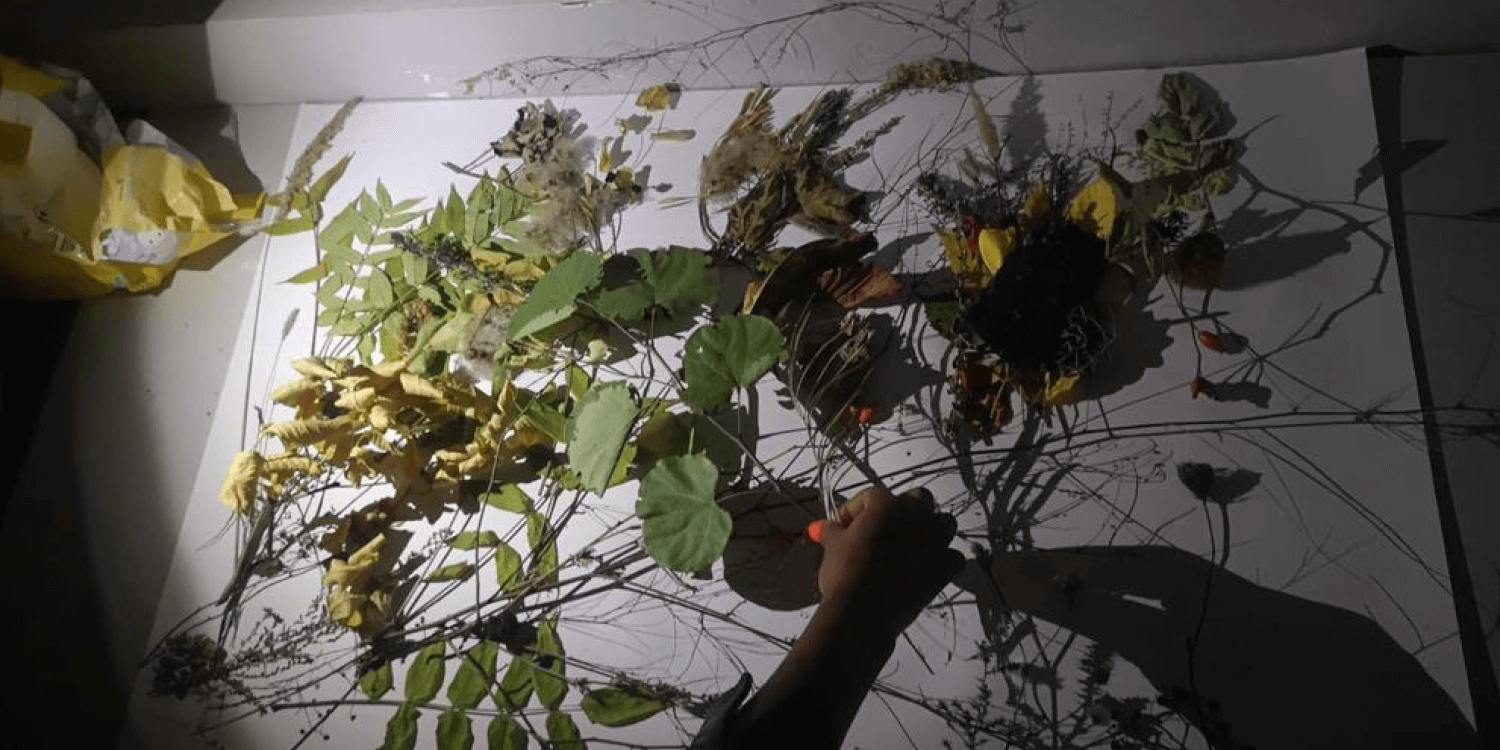 A collection created during the Moving Plants public workshop, led by Jonn Gale as one of four mentors invited to the 2023 School of Kindness and Moving Body Festival's Critical Moves Research Residency in Varna, Bulgaria. Image courtesy of Vanessa Vasic-Janekovic.
A collection created during the Moving Plants public workshop, led by Jonn Gale as one of four mentors invited to the 2023 School of Kindness and Moving Body Festival's Critical Moves Research Residency in Varna, Bulgaria. Image courtesy of Vanessa Vasic-Janekovic.
What is the current focus of your creative practice?
My work primarily explores ethnobotany, visual ethnography, and creative writing, with a focus on the intersections between botanical archives, cultural knowledge, and conservation practices. I am particularly interested in how plant-based knowledge is documented, transmitted, and preserved across generations, as well as the role of storytelling and visual media in reimagining botanical histories and ecological narratives.
What drew you to apply for this residency and how do you think it will inform your wider practice?
G.A.S. Foundation's archival and farm projects, and its efforts to facilitate interdisciplinary Pan-African networks, reflect closely with the aims and interests of my practice. This residency presents an opportunity to expand my research and work experience, enhance my theoretical knowledge, and refine my critical thinking skills. It will also allow me engage in planning and designing effective research strategies. The residency will also help build my professional confidence, broaden my experience in public engagement, and strengthen my public speaking and facilitation skills. Working collaboratively will provide a valuable opportunity to assess and improve the qualities needed for effective collaboration and ethnobotanical research.
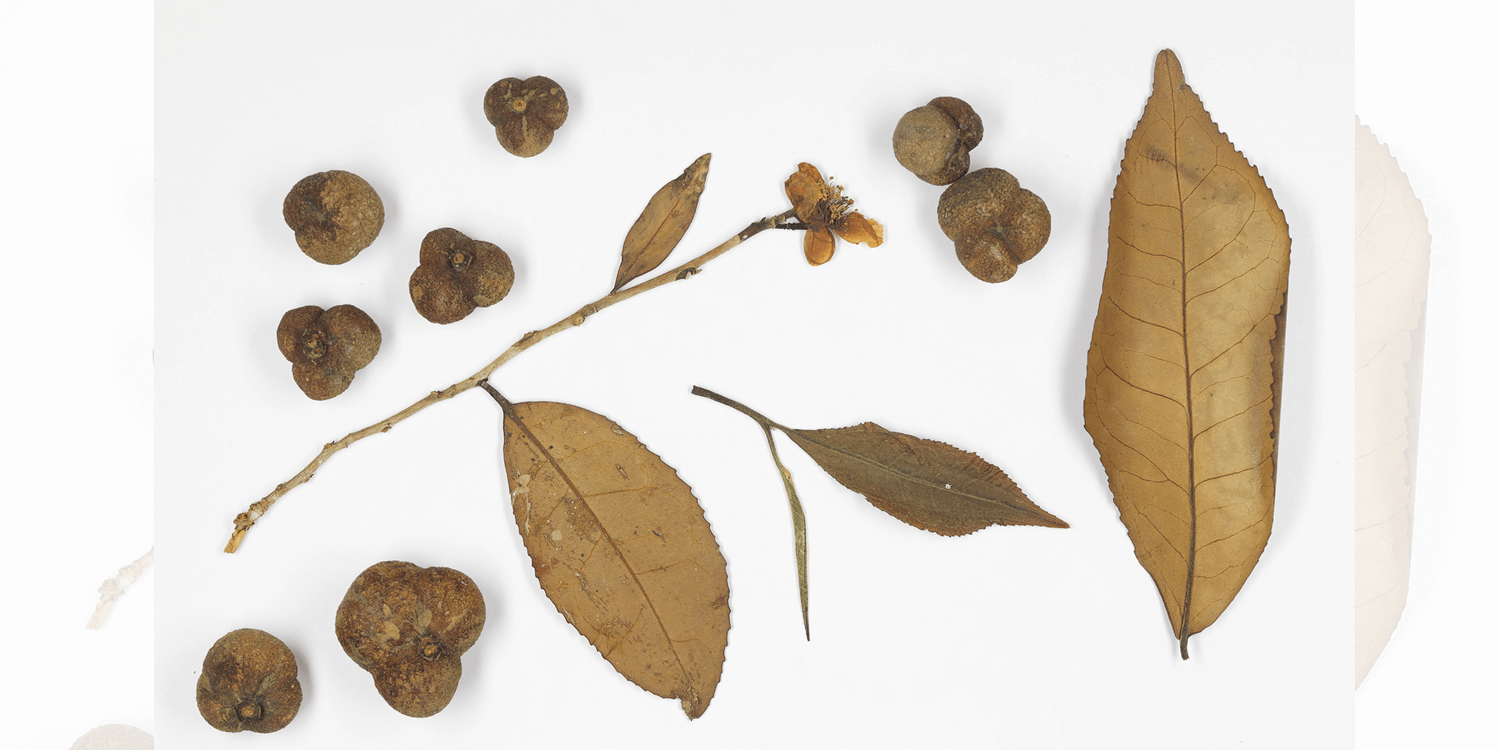 Tea Digitization – Economic Botany Collection, Royal Botanic Gardens, Kew. Summer 2022. Image courtesy of Jonn Gale, Aurora Prehn, and the Royal Botanic Gardens, Kew | Economic Botany Collection.
Tea Digitization – Economic Botany Collection, Royal Botanic Gardens, Kew. Summer 2022. Image courtesy of Jonn Gale, Aurora Prehn, and the Royal Botanic Gardens, Kew | Economic Botany Collection.
Can you give us an insight into how you hope to use the opportunity?
I hope to explore and document local plant knowledge, traditional agricultural practices, and the cultural narratives tied to these traditions. My aim is to use my ethnobotanical practice to address challenges related to biocultural conservation and the transmission of traditional plant knowledge in Nigeria. I plan to engage in dialogue with local producers, healers, and knowledge-keepers to record oral histories and plant-based knowledge while facilitating community-centered workshops focused on ethnobotany and herbarium studies. These discussions will contribute to reimagining the organization of a botanical archive. I intend to organize and lead the development of an accessible archive at the farm that integrates both physical and digital elements, providing resources on regional ethnobotanical knowledge, biocultural conservation, and ecological restoration. I will also explore new approaches to ethnobotanical knowledge transfer, data collection, and management. Another key aspect of my work will be curating a Reader on the intersections of arts, botany, agriculture, and ecology, drawing from materials in the G.A.S. library, archives, and newly gathered documentation. I also aim to contribute to the development of an academic and museum partnership infrastructure for Re:assemblages and the AAL Lab.
This opportunity also allows me to put into practice the ideas shaping my PhD research and ethnobotanical practice. Through the residency, I hope to expand my creative and research network and deepen my understanding of African ethnobotanical knowledge systems, which will benefit both my PhD research and my broader practice.
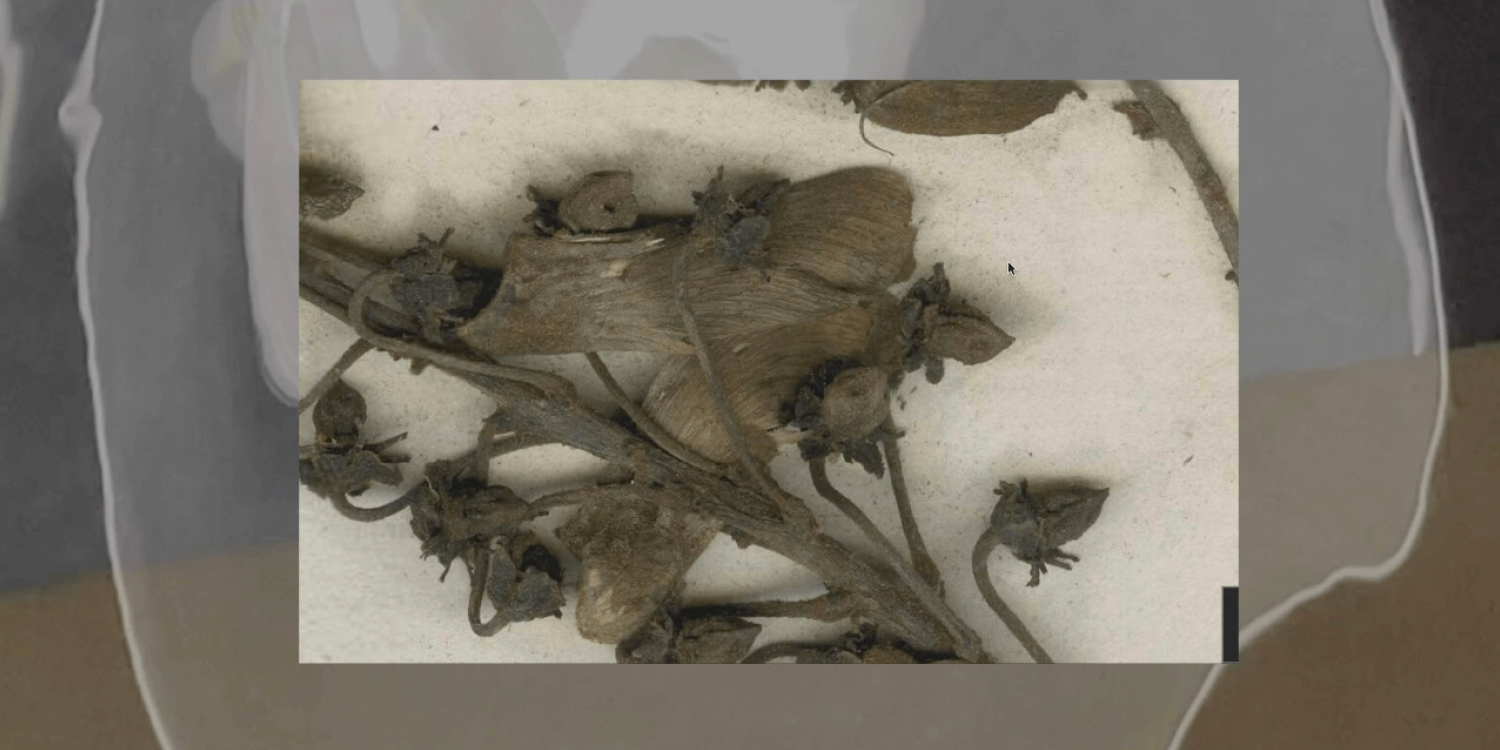 they too have their particular haunts, 2024. Visual ethnography practice guiding Jonn Gale's PhD research into the Black and Indigenous naturalists of the Linnean material archive. Image courtesy of Jonn Gale.
they too have their particular haunts, 2024. Visual ethnography practice guiding Jonn Gale's PhD research into the Black and Indigenous naturalists of the Linnean material archive. Image courtesy of Jonn Gale.
RESIDENCY ARCHIVE
Event: Understanding Plants - Botany and Herbarium Practice
Event Date: 27th March, 2025
On the 27th of March 2025, as part of her residency at G.A.S., London-based ethnobotanist Jonn Gale facilitated a community-based workshop for students from St. John’s Primary School, Ikiṣẹ.The session introduced the young learners to foundational concepts in botany and herbarium collection, offering a hands-on opportunity to explore the natural world and their environment. The workshop formed part of Jonn’s 12-week residency, during which she has been based primarily at the G.A.S. Farm House in Ikiṣẹ. Her research explores traditional plant knowledge, medicinal practices, and ecological systems, bridging ethnobotanical inquiry with local expertise and broader environmental questions.
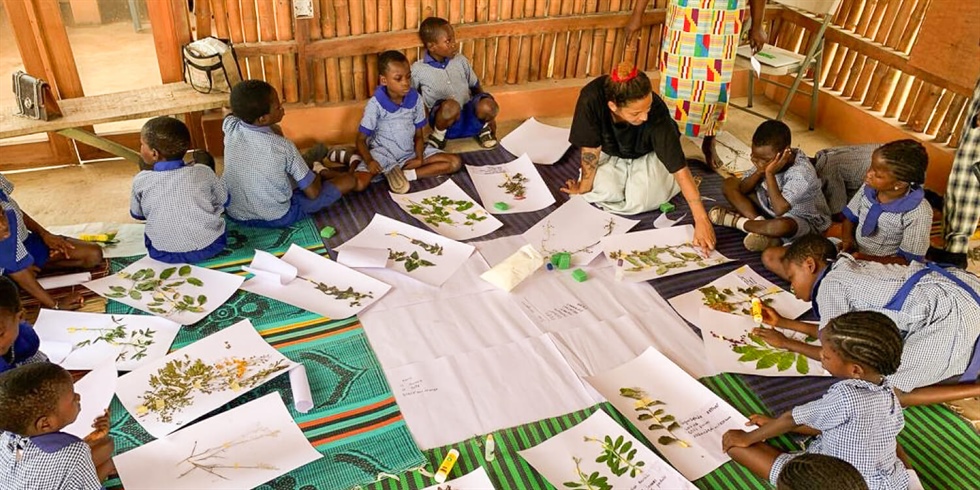
Event: Spiral Margins/Ecotonal Memories
Event Date: 17th April, 2025
On April 17th, 2025, Spiral Margins/Ecotonal Memories marked the culmination of London-based ethnobotanist Jonn Gale’s 12-week residency at the G.A.S. Farm House in Ikiṣẹ. The event explored the entanglements of botanical archiving, embodied knowledge, and cultural memory. Drawing on collaborative exchanges with local herbalists, farmers, elders, and children, Gale cultivated a spiral-shaped garden as a “living botanical archive,” featuring medicinal plants labelled in both Yoruba and scientific terms. Framed by the ecological concept of the ecotone—a transitional zone between ecosystems—her work bridged Indigenous and scientific epistemologies, while also engaging themes of return, healing, and ancestral reconnection inspired by Malidoma Somé’s Of Water and the Spirit. The event included a presentation, a guided walk led by the farm supervisor, and a communal seed-sowing session. Each element invited participants to engage with plants not as specimens, but as carriers of intergenerational knowledge, sensory experience, and cultural continuity.
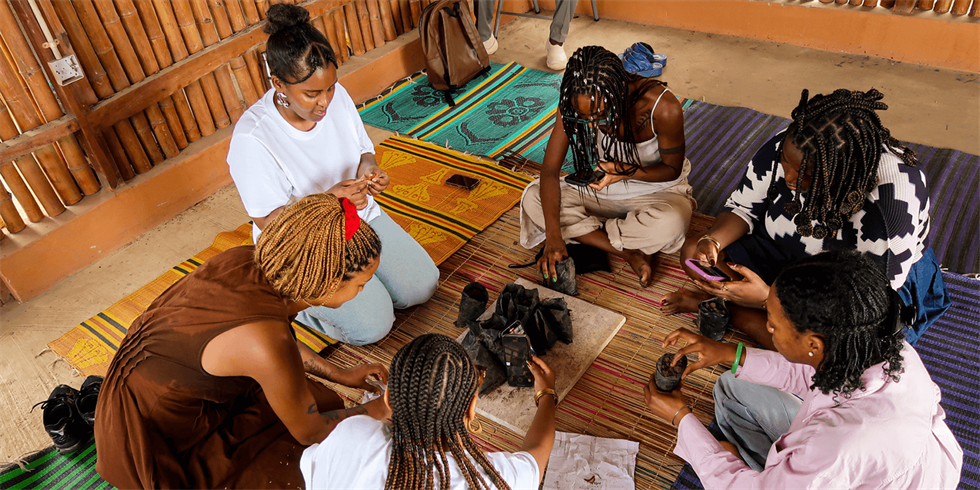
ABOUT JONN GALE
JONN GALE is a London-based ethnobotanist working across botanical collections. Her work combines speculative analysis of historical and archival material, ethnobotanical research, and sensory-focused visual ethnography as a means of generating more multiverse, relational, process-focused, and horizontal botanical archival research practices. Her practice centers on nonlinearity, multi-species livability, and the agency, endurance, and affective temporalities of botanical objects as historical actors capable of narrating alternative histories. She is currently undertaking a practice-led, AHRC/CHASE-funded collaborative doctorate at Birkbeck, UOL, and the Linnean Society of London, investigating the contributions of Black naturalists to eighteenth- and nineteenth-century natural knowledge. Her research involves the study of botanical specimens and manuscripts held at the Linnean Society, identifying and tracing hidden actors, mapping knowledge networks, and developing a new decolonial approach for recovering and sharing information from this archive.
Jonn Gale's residency is supported by CHASE and G.A.S. Foundation.
